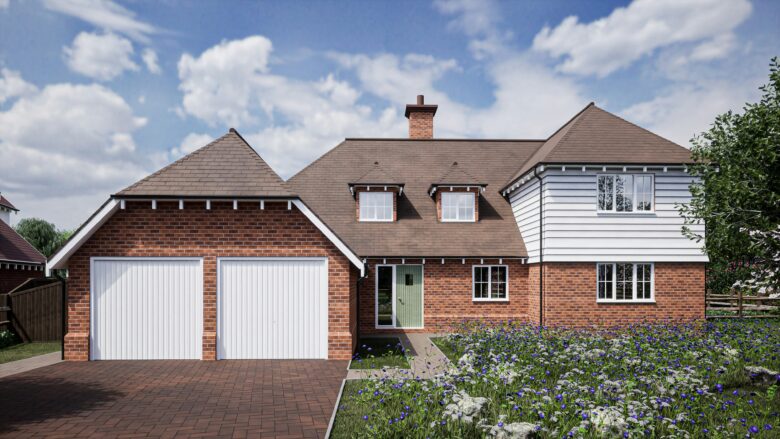
Buying a New Build vs Old House: Which One is Better?
Buying a home is always a huge decision. Factors such as price, location, size and potential must all be weighed to determine which property will most suit how you live now and in the future. But what about the age of the home? Does a new build offer better value, or is the older home in a more sought-after neighbourhood? Both can offer advantages and disadvantages, so how do you decide which is best?
Pros and cons of buying a new build
As a new build has never been lived in, one of the most exciting parts of buying one is that everything is brand new, unused and should be in perfect condition. It’s also often the case that the developer will allow you to have some input into finishes such as flooring and kitchen and bathroom units, so you can tailor the final look to your own tastes too. This is particularly likely if you buy off-plan before the developer has completed it.
On a more practical level, the benefits of buying a new build include that a chain won’t impact you, so there should be less chance of the deal falling through. The developer may also offer incentives such as paying your stamp duty or offering upgraded finishes, so it can also make financial sense. In the longer term, running costs associated with a new home can be lower. Not only do they tend to be more energy efficient, so bills will be lower, but they also require less maintenance and upgrades.
That said, investing in a new build isn’t without its potential downsides. They are often more compact than older homes, and outside space can be less generous as developers look to fit more properties into their plans. As with any other product, its value will be highest when it’s brand new, which means new builds can initially drop in value before rising again in the longer term. In fact, buying a new build can be a longer-term project in general, as it can be some months before the building is ready to be lived in, and projects can often face delays, which in turn can impact mortgage offers.
Finally, it’s worth noting that many buyers of new builds face frustrations with the quality of the build and snagging problems when they move in. These can take time and effort to resolve, and while new builds do come with warranties, they are often limited in what they cover, especially if you’ve lived in the home for more than a couple of years before discovering the problem.
Pros and cons of buying an older property
When buying an older property, many people fall in love with the period features and character they offer, as well as their size and the fact that they’re often in more established locations. While older homes can be cheaper upfront than new builds, period properties can command a premium, with Georgian properties particularly popular with buyers. Established homes often provide greater opportunities for adding value. Loft conversions and extensions are popular methods to increase space, enhance modern living suitability, and boost property value. Naturally, any renovations will require an investment, so these costs should be included in your budget. Additionally, this budget should account for extra expenses related to wear and tear and maintenance, as older buildings typically need more upkeep to remain in good condition. Older homes might also conceal more serious problems, such as structural defects, making it crucial to have a thorough assessment before finalising the purchase, even if you’re planning on carrying out renovations.
Tips for buying a new home
The most important tip for buying a new home is to ask questions and ensure everything is confirmed in writing. This way, you can be confident that your expectations will be met. If you negotiate for upgraded fixtures and fittings, make sure these are included in your contract, along with any incentives such as the developer paying your stamp duty.
Additionally, don’t hesitate to negotiate. The developer will likely be eager to secure the sale, so ask if they can offer any incentives to close the deal. Ensure you are clear on schedules, particularly if you are selling a property or arranging a mortgage, as any delays can have significant impacts. Stay in touch with your developer throughout the process to be promptly informed of any issues that may arise.
As your move-in date approaches, be sure to organise a Snagging List before your completion date. It is essential to do this in advance, as research shows that over half of new builds contain hidden defects. If these issues are not identified before you move in or reported within the specified timeframe, you may be responsible for covering the repair costs.
When getting a new build Snagging List, a specialist snagging inspector will thoroughly inspect the property and document any defects. This could range from poorly installed doors and windows to untidy paint finishes and unfinished fittings. It will then provide photographic evidence to your developer to ensure they correct their work, saving you time and money.
Tips for buying an older home
When buying an older home, you must be fully aware of the state of the property, including any major issues and potential future maintenance concerns. For this reason, the top tip when buying an older home is to get a comprehensive building survey. This will highlight areas of poor condition and explain the implications of these faults, assessing structural integrity, property build and construction materials and highlighting any repairs already made. If issues are detected, it will also explain repair options and costs so you can be confident you’re offering a fair price for the property. If major problems are highlighted, a building survey could be the thing that stops you from making a costly mistake.

